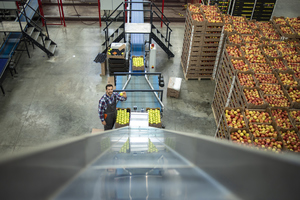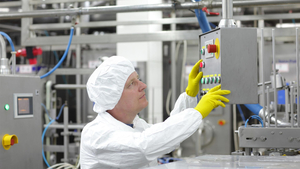

|
Edward Lowton
Editor |


|
| Home> | Efficient Maintenance | >Industry 4.0 | >Driving F&B exports with a proactive maintenance approach |
Driving F&B exports with a proactive maintenance approach
23 January 2024
Food and beverage manufacturers should capitalise on export growth opportunities by embracing specialist maintenance solutions and energy reduction strategies, says RS

ENGINEERS IN the food and beverage manufacturing industry need to embrace industrial technology to capitalise on export growth opportunities following reports of record figures for the first half of 2023, suggests RS.
While the Food and Drink Federation’s Trade Snapshot report highlighted EU-driven export growth, with increases of more than 7%, volumes have been impacted by industry challenges including labour shortages and rising energy prices. RS says in order to maximise growth opportunities, the industry must tackle the mounting pressures by embracing specialised services and solutions that will help them combat energy price hikes and avoid costly plant downtime.
"The export growth news was heartening for the industry and demonstrative of its resilience," said Craig Stasik, industry sector manager for process, chemical and intralogistics at RS. "However, to fully maximise the growth potential, a proactive approach to energy reduction and efficient plant operations is crucial as these, along with labour shortages, are major challenges for the industry right now.
Tackling rising energy costs
"Soaring energy costs are a constant headache for food and beverage manufacturers, but focusing instead on reducing energy levels is a better approach to reducing costs, and holds other benefits like meeting sustainability goals. Energy reduction is usually also a side effect of a proactive maintenance approach, which manufacturers in this space should be embracing," he adde
The latest Food and Drink Federation’s State of Industry report, for Q2 2023, highlighted energy as a major cost for many manufacturers, with 25% of mid-size businesses and 17% of the smaller ones reporting energy to be more than 20% of total operating costs. Instead of navigating the volatile energy market and trying to game future market pricing, industry operators should instead focus on achieving optimum plant efficiency, thus reducing energy levels, says RS.
"Food and beverage is the biggest UK manufacturing sector, but one in which machinery and assets are often outdated," Stasik explained. "When machinery isn’t operating at optimum levels, energy consumption is drastically affected, as well as the high risk of equipment failure.
"Maintenance engineers can utilise specialist service providers to help them implement the right technologies including condition monitoring, which comprises elements like thermal imaging and vibration analysis. These can help detect potential maintenance issues before they become problematic and help avoid reactive and expensive unplanned maintenance down the line," he said.
"Furthermore, when taking a proactive approach to maintenance and using data gathering and analysis tools, this data can facilitate the sharing of best practice across multi-site operations. This provides better visibility of group assets and performance, negates lost time searching for information across multiple sites, and avoids missing warning signals of potential equipment failure. This can be hugely beneficial to operational profits."
Operational profits are of paramount importance, as industry players are being squeezed by factors like rising vegetable oil prices, crop prices as a result of the extended southern Europe heatwave, and the rapid increase in interest rates over the last 18 months, making borrowing more expensive.
Supporting business growth
In this industry, says RS, embracing maintenance solutions as part of a proactive maintenance strategy - while recognised as key to achieving operational efficiency - can be restricted by lack of budget. The FDF’s State of Industry report did reveal that manufacturers remain committed to growth: almost half surveyed plan to increase their capital investment expenditure in the next 12 months. However, at the smaller end of the business scale, while half of SMEs plan to increase capital expenditure, the other half plans to cut investment, indicating difficulty in accessing finance and blighted by ongoing cost pressures.
"All players in the food and beverage market are under serious pressure to retain market share, in among all the other pressures on them. But with the glimmer of hope of rising exports, and a general increased confidence among businesses in this arena, finding ways to implement maintenance solutions and strategies that will reduce unplanned downtime, extend the life of assets and save energy is no longer an option but a necessity for those looking to not just survive, but thrive and grow," Stasik concluded.
For for information:
Tel: 03457 201201
- RS releases 2026 Indirect Procurement Report: 'Uncertainty Driving Efficiency'
- Expanding portfolio
- Unlocking dormant data improve maintenance decision-making
- Automation & control portfolio
- Visitor experience celebrates digital world
- The key to effective maintenance strategy
- RS releases 2025 Indirect Procurement Report: Tackling the cost of business
- Guess-free decision-making
- RS Group completes acquisition of automation and control specialist BPX Group
- Compact fan kits
- Technology and Open Standard data enabling smart maintenance
- Broadband sensors: Pinpointing leaks in compressed air systems
- Mechanised welding, cutting and Industry 4.0
- Tomorrow’s tech is here today
- Investment in infrastructure, innovation and people
- Getting to 4.0 – one hard-won gain at a time
- Digital transformation in the chemical industry: White paper
- Digital industry around the world
- Guidance via AR
- How machine learning is transforming predictive maintenance



















